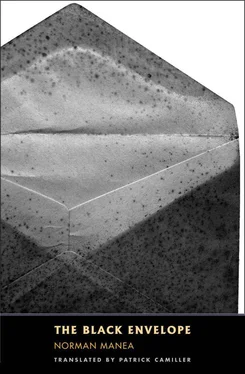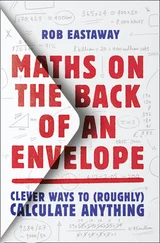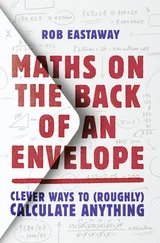Oh, how many postcards and letters of thanks did Mrs. Veturia receive from the four corners of the earth!
She did not accept money, nor did she reject kindnesses. Convertible trinkets, exchange values facilitating survival. More than once in childhood Veturia had witnessed the philanthropic exercises of exalted society ladies. And having reached retirement along a path of humiliating accidents, the so-called madam doctor was not at all immune from those reveries of high society which, stimulated by a still alert memory, themselves activated a chain of recollections now that everything had turned upside down and grown ugly, as accepted criteria had become inverted and feelings brutalized. To be offered philanthropically, from a dirty pocket, a crumpled cigarette which (to cap it all) you actually need; or a wretched tablet, wrapped like babies’ sweets in colored cellophane paper, without which you really cannot last out the day! She had been habitually polite with the arrogant salespersons in stores where nothing was to be found, or indulgent with a lazy and churlish typist, or impassive in the face of cursing bus drivers ready at any moment to leave you in the street, or diffident in the presence of a snotty little boy using his father’s card, or even his own, to obtain special privileges. So she had accepted the sly philanthropy, caricatured in hurried and condescending gestures on the part of future doctors from distant and unfamiliar regions. Their transit-lounge trophies — cigarettes, transistor radios, drinks, stockings, cassettes, chocolate — were only a cosmopolitan confirmation of the inevitable: of the fiddling practiced throughout the world; the outrage that disfigured the present and deserved only the skeptical smile of indifference. Surrogates and perishable mass-produced goods from the planetary fair! How will Mrs. Veturia put the cigarette in her mouth … As for the drinks, she got dizzy even from the rum mixed drop by drop into the cream filling of her cakes. But she could not have denied the pleasure of arranging the cartons, the bottles, the spectacular jars. Her eyes shone guiltily, as if those colored objects were a shield against everyday banality. Fortified, ennobled — as if they made her a real person again, defended by such puerile enrichment; as happens to children when they receive gifts beyond the reach of their social class and cannot contain their wonderment.
Veturia could not have identified the moment when some student threw a gleaming carton of cigarettes or a potbellied jar of coffee onto the table. Even after she remained alone in the room, she managed not to notice the object for a long time. Again and again she passed near the temptation — until she was no longer able to hold off the poison blindness doom of a base pleasure that she did not wish to know but could not struggle against. Then the inevitable shiver passed down her: the devilry took over and she threw it into the back of the cupboard.
Several days went by. The door of the weapons safe opened wide, grinning, creaking, swinging, pinging, and sneering. The culprit blinked with excitement, paralyzed in front of the toys. An idiotic smile twisted her already creased mouth, her lips parched by impatience. She went right inside the guilty cupboard for a thorough classification and arrangement: the shelf with the Kents, the shelf with the olive oil, the cosmetics, the chocolate and coffee and chewing gum, the bottles, jars, and boxes. She did not need to hear steps behind her to feel that her Matei was already standing in the door.
He would watch her, of course, silently, and damp with perspiration. Veturia continued with her business of selecting and ordering. Then, finally drawing herself up straight, she would turn to her husband — who would be standing dazed in the same position — and offer him the most serene face, with smooth forehead and a smile carefully planted on her round and placid cheeks. “We really need all these little knickknacks, Matei. Oh dear, they do come in so handy! Otherwise who would glance at us anymore, old as we are! If you give Old Nick a pack of Kents, you’ve got him on your side for a good year. And Jezebel, too — a bit of face powder will solve a lot of things. She even brings me detergent, as you see.”
Each time the words rushed over Matei with the same effrontery, so that the petition he had just come to read to his wife shook in his hands. As if his text had suddenly been superseded by an oral version arguing the exact opposite. What of the lofty principles that he repeated every day in his rhetorical battles? “We really need all these little knickknacks, Matei. We’re old people: we haven’t any children. What if we fell ill — heaven forbid? At our age those great humanists of yours wouldn’t even let us through the hospital doors. You’ve seen how things work at that whore of a chemist’s. And what if our shower broke down? We’d still end up going to Stringpuller Satan. With one packet of Kents we’ve got ourselves some peace of mind. Nowadays that foreign trash can help with any of our troubles.”
Dear Matei rolled up the sleeves of his pajama jacket. No, he was no longer a hero, no longer the young man defiantly taking — he of all people — the ostracized name of his wife. The name of a family of reactionaries and Fascists and exploiters! He, the one eternally persecuted, had refused the vengeful persecution of others and even assumed that blacklisted name. And he had paid dearly for that rush of pride. No, he was no longer the foolhardy man of old, even if he still kept his ideals alive with all his failing strength. So he was determined, absolutely determined, to take his old-fashioned ideals and withdraw into his workroom.
After an hour or so, when she had finished her labor of classification, Veturia appeared in Mr. Gafton’s study. She bent over the sheets of paper lying scattered on the table. “After a brief period in which the quality of matches improved, reasons for dissatisfaction have again appeared. The phosphorus-tipped sticks are acceptable, but the strip on the box which makes it possible to light them is too thin and tears at the first strike. I have written before about this problem. It is astonishing how little time the effects of the criticism lasted. The match factory should take a more responsible attitude to the quality problem and respect the undertakings it has made.” A few blank lines followed, and then the draft of another letter, apparently more important, since the opening had several times been crossed out and started again. “We refer to the report in your paper in March of this year. Let us, then, recapitulate the facts about the ill treatment of the woman who looked after animals in her apartment.”
It was hard to tell whether he had or had not heard her come in. Dominic could imagine at such moments that Matei would not move from his position in front of the window, moments no different from those in which they met for a chat, each preserving his own strategy.
Dominic gave no sign of knowing what happened on the pedagogical mornings of Veturia the invisible. And Mr. Gafton resumed his narratives of the Second World War, without making any allusion to the tragedy of the Vancea family or to his own revolutionary conversion in those days of wrath, even though they were implicit in the subject. “There’d be no point in asking me to focus on everyday life. What was a betrothal, or a funeral, like in those hard times? How did the authoritarian language of distrust permeate ordinary speech? It’s hard for me to remember such details. But the events I’m concerned with played a decisive role, and this can be imagined in the existence of the man in the street. So let us recall those few days before the invasion of Poland.”
Given such familiar notice, you could not for long continue soaring through the clouds. You were forced to cast a look at the terrestrial wilderness; to observe, somewhere amid the bustle of drunken ants, a copper needle with a rusty head; to recognize the figure of a man — our freckled, skinny friend Matei himself — swaying in time with his own sentences, just a few steps from the apathetic listener.
Читать дальше












